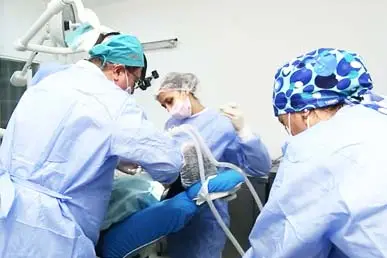
GENERAL ANAESTHESIA SERVICES
Our specialist anaesthetists can safely administer general anaesthesia, as well as the intravenous administration of sedatives.

Our specialist anaesthetists can safely administer general anaesthesia, as well as the intravenous administration of sedatives.
This in-house service is rare in dental surgeries in Turkey, and indeed abroad. Our specialist anaesthetists can safely administer general anaesthesia, as well as the intravenous administration of sedatives. Our general anaesthesia equipment, including special hysteresis filters, is hygienically sterilised and is approved by the Ministry of Health. If you, or a member of your family, suffer from dental phobia, or are disabled, or require paediatric dental treatment, please let us know, and we can make the necessary arrangements. For our patients, our clinic has six fully functional operating theatres offering general anaesthesia. We also provide a comfortable VIP rest room for patients recovering from anaesthetics.
General anaesthesia is performed in operating theatre conditions and causes the loss of sense and consciousness in a patient. Sedation is a state of sleep, and both are created by delivering drugs intravenously, adjusted under the careful eye of a professional anaesthetist, thus maintaining the vital reflexes of the patient, such as breathing (via respiration gasses) and swallowing.
The patient is connected to the anaesthetic apparatus through a sterile tube inserted in the trachea; the vital functions of the patient such as pulse, respiration, blood pressure, concentration of oxygen to the tissues, and body temperature are controlled by our fully trained anaesthetist. The patient and environment are prepared for emergency intervention, if required. The patient is awoken from anaesthesia under the care of our reanimation specialist at the end of the procedure, and monitored until the patient recovers completely. Anaesthetics cause temporary retrograde amnaesia, with the patient not being able to remember any discomfort at the beginning of procedure. The procedure is usually limited to 1-1.5 hours, with further visits required for longer procedures.
General anaesthesia is generally used for small children, adults with dental phobia, and disabled patients with cooperation/coordination problems, and who cannot be treated under normal clinical conditions (such as local anaesthesia). These groups of people might interrupt the dental treatment with physical reactions (such as gag reflex, involuntary defensive twitches, and spasms) that might prove to be a danger to themselves, or negate the treatment altogether by their physical reactions or actions.
The administration of general anaesthesia is under the careful eye of a professional anaesthetist in one of our fully equipped operating theatres. General anaesthesia takes place only after a detailed evaluation of the general condition and medical history of the patient has taken place. It must be pointed out that any drugs administered to the body will have side effects. It is also very important for a patient to follow recommendations before and after the operation. The advances in drugs and devices have now significantly reduced the risks.
Any medication administered to the body will have side effects with minimal risks. The medications offered for general anaesthesia, and especially unconscious sedation, are safely administered by an anaesthetist and reanimation specialist in a fully equipped operating theatre, only after a detailed evaluation of the general condition and medical history of the patient. It is very important for a patient to follow recommendations before and after the operation. Advances in the drugs and equipment used have now significantly reduced the risks.
As many dental treatments can cause pain, anaesthesia is sometimes required. Under normal clinical conditions, the area of the jaw where the treatment is to be performed can be anaesthetised with a local anaesthetic, allowing the dentist to perform procedures, such as filling a tooth, root canal therapy, and tooth extraction, without causing discomfort to the patient. However, this only protects the patient from physical pain, while patients with dental phobia, such as fear and anxiety, children and the disabled may require general anaesthesia to control the patient’s reflexes. It is important for the patient’s mouth to remain open throughout the dental procedure. Understandably, it is necessary for a patient to comply to the dentist’s commands and instructions while being treated, and not to give uncontrolled reactions, or by being injured by sharp instruments rotating at high speed. Children especially, can be a serious problem and source of distress to parents when resisting treatment, and can give uncontrolled reactions while being treated.
We tell you the total cost of your treatment from the beginning and then avoid any additional costs. You can be assured that there will be no extra cost, except the total cost of dental treatment sent to you. You will be answered by both email & WhatsApp.
Leave a Reply
Your email address will not be published. Required fields are marked *
12 Comments